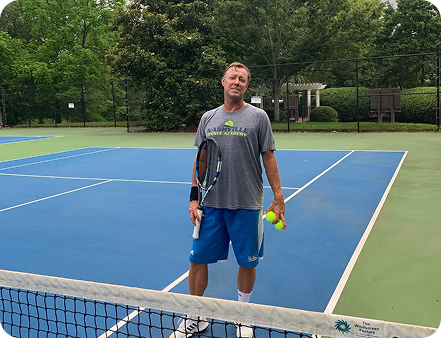Definition:
Mindfulness is awareness of one's internal states and surroundings, our thoughts, emotions, and experiences, without judging or reacting to them. It involves focusing one's awareness on the present moment, the intentional act of giving your undivided attention to what is happening right now.
From famed Mindfulness Author and Practitioner Jon Kabat-Zinn: "Mindfulness is paying attention in a particular way: on purpose, in the present moment, and nonjudgmentally. Mindfulness is about shifting out of autopilot and awakening to the here and now."
What is Mindfulness
Mindfulness & EQ Questions for Competitive Tennis Players
There are no right or wrong answers here. We are simply trying to establish a baseline score from which to work from. Select the option that best describes you.
Let's See Where You Are At
Why Mindfulness is Important
In Your Life
Stress Reduction & Calm
Mindful breathing and awareness lower cortisol and anxiety, creating steadier emotional states in daily challenges.Better Relationships
By listening fully and responding intentionally, mindfulness nurtures empathy and strengthens bonds with family, friends, and colleagues.Healthier Decision-Making
Staying present reduces impulsivity, allowing for wiser, more deliberate choices in personal and professional life.Greater Resilience
Just like on court, mindfulness fosters the ability to recover from setbacks—be it in career, education, or relationships.Deeper Fulfillment
By appreciating simple moments and cultivating gratitude, mindfulness increases overall life satisfaction and well-being.
For Your Tennis
Sharper Self-awareness
Mindfulness helps players notice emotions (fear, frustration, anxiety) as they arise, allowing quicker recognition and more intentional responses during matches.
Improved Emotional Regulation
Through breathing, body scans, and reset rituals, players are able to manage nerves better sustaining and maintaining composure thoughoutEnhanced Focus and Presence
By training attention to the present moment, mindfulness reduces distractions (score, opponent behavior, outside noise) helping sustain and foster flow.Resilience in Adversity
Players learn to observe mistakes without judgment, bounce back from setbacks quicker, treating adversity not as a threat but as a fresh opportunity to overcome.Strengthened Perspective
Mindfulness cultivates gratitude and balance, helping players see tennis as a joyous journey and not a referendum of their self-worth, preserving health and longevity throughout.
How To Become More Mindful
5 Tips for Cultivating Mindfulness on Court
Build a Pre-Point Reset Routine
Take a deep breath, use a short mantra or affirmation to heighten present awareness before every serve or return. This anchors attention in the present.Use Body Awareness During Matches
Notice your grip pressure, footwork rhythm, or shoulder tension. By scanning your body between points, you can release tightness and stay loose.Practice Single-Task Focus in Drills
When training, pick one element (like contact point or breathing) and give it 100% attention. This strengthens the muscle of mindful focus under pressure.Reframe Mistakes as Observations
Instead of judging (“I can’t believe I missed that shot”), shift to noticing (“my spacing was off”). This mindful awareness helps neutralize frustration and encourages learning.Anchor to the Environment
Between points, tune in to a sound (the bounce of the ball, your breath, the wind). This grounds you in the moment and interrupts spirals of anxiety or doubt.
Off-Court Mindfulness Actions for Tennis Players
Daily Breathing Practice
Spend 5–10 minutes each morning or evening on deep, intentional breathing. This builds calmness and mental clarity before the day even begins.Mindful Eating & Hydration
Slow down meals—notice flavors, textures, and satiety cues. Pair this with conscious hydration habits. It strengthens body awareness and self-discipline.Digital Detox Moments
Set aside short windows (even 15–20 minutes) free from phones or screens. Use the time to sit, walk, or journal. This practice reduces overstimulation and increases focus.Journaling & Reflection
At the end of the day, write down 3 moments you’re grateful for and one lesson learned. This cultivates perspective and emotional balance.Mindful Movement
Outside of tennis training, practice yoga, tai chi, or even mindful walking. Focusing on breath and body alignment develops awareness that translates directly to footwork and shot rhythm.
Summations from Research: Mindfulness & Athletic Performance Enhancement
Improved Emotional Regulation & Self-Regulation
A recent study found that athletes who report higher levels of “body mindfulness” (being aware of what their body is doing/feeling in the moment) show better attention regulation and self-regulation, which translates to improvements in execution and overall play (e.g. flow, technical consistency, commitment).
Mindfulness helps athletes notice emotional states (anxiety, frustration) early so they can act (breathe, reset) instead of reacting.
Enhanced Flow / Fluency & Performance under Pressure
A meta-analysis showed that mindfulness training (typically over several weeks) positively effected athletes’ fluency (being “in the zone”), reducing psychological anxiety, and boosting performance in competitive contexts.
Athletes trained in mindfulness tend to maintain performance consistency even when stressors—crowds, mistakes, fatigue—are present.
Reduced Anxiety, Stress, and Psychological Distress
Studies report that mindfulness‐based interventions (MBIs) significantly reduce sport anxiety and the stress associated with competition.
Elite athlete wellness studies show better mental health outcomes—lower rates of burnout, better mood regulation, fewer negative psychological symptoms—when mindfulness is regularly practiced.
Better Attention & Focus
Research indicates that paying mindful attention to both body and mind improves ability to focus on the task, reduces mind wandering, and improves error sensitivity—meaning athletes better notice what’s going wrong and can correct earlier without losing momentum.
Mindfulness helps with sustained attention, which matters in long matches or longer tournaments
Enhanced Well-Being & Recovery
Mindfulness is linked to improved mental well-being, quality of life, and emotional health among elite athletes—protecting them from the toll of constant performance pressure.
It also helps with recovery: mental recovery (letting go of previous match’s mistakes or pressure) and physical recovery (better sleep, less stress, lower physiological arousal after intense training or competition).
How to Sustain Mindfulness Practices
Anchor to Daily Routines
Attach mindfulness to things you already do—like breathing exercises before breakfast, or a short body scan before bed. Linking it to existing habits makes it automatic.Keep It Short & Consistent
Five minutes every day is more powerful than thirty minutes once a week. Consistency matters more than duration when building mindfulness as a habit.Track Your Progress
Use a journal or app to note when you practice and how you felt. Tracking creates accountability and reveals patterns in your emotional growth.Mix It Into Tennis Training
Blend mindfulness into warm-ups, cool-downs, or even serve routines. This keeps practice relevant to performance and reinforces its importance on court.Return Gently After Missed Days
Skipping a session happens. Instead of guilt, respond with self-compassion and simply begin again. This mindset keeps the practice sustainable over months and years.
LOOK WHO ELSE THINKS THIS IS IMPORTANT
Public Figures & Mindfulness Advocates
Jon Kabat-Zinn
Founder of the Mindfulness-Based Stress Reduction (MBSR) program, Zinn is a leading researcher who has made mindfulness an asset for people facing stress, pain, and illness, teaching that being present and non-judgmental can change your relationship with mental and physical challenges.
Oprah Winfrey
She’s spoken publicly about how Transcendental Meditation and other mindfulness practices help her stay grounded, maintain clarity, and make decisions with purpose. For her, mindfulness is part of managing her high-pressure life while maintaining alignment with her values.
Kobe Bryant
The late NBA legend said meditation was his “anchor,” something he used every morning to create calmness, poise, and control over his mindset. He credited mindfulness work with helping him stay centered under the spotlight and bounce back from adversity.
Novak Djokovic
Djokovic has openly discussed his use of mindfulness, meditation, and visualization to stay calm under pressure. He credits mindfulness practices with helping him sharpen focus, regulate emotions, and sustain his career longevity.
Have a Question? type it here and we'll answer it
Lets Retest
Compare your score with your earlier one. Chart your improved understanding of the all-important topic of MINDFULNESS
Mindfulness & EQ Questions for Competitive Tennis Players
There are no right or wrong answers here. We are simply trying to establish a baseline score from which to work from. Select the option that best describes you.











